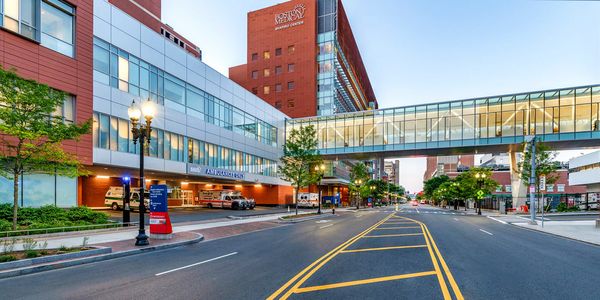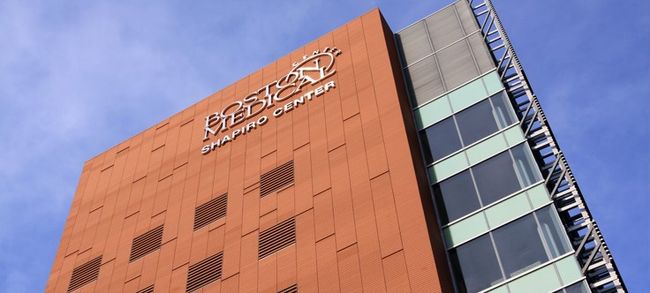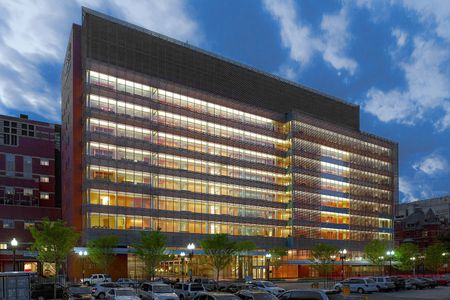Boston Medical Center (BMC), Boston Veterans Affairs Health System (Boston VA), and DaVita Boston Dialysis Center are three clinical training sites for our nephrology fellowship program. Please take an aerial tour of BMC by clicking here: Aerial Tour.
Boston Medical Center, a 514-bed academic medical center, is the principal teaching hospital of Boston University School of Medicine. Boston VA is a tertiary-care referral hospital system for veterans in New England. DaVita Boston is the largest outpatient dialysis center affiliated with the academic nephrology practice in Massachusetts. DaVita Boston serves about 225 hemodialysis and 50 peritoneal dialysis patients.
Fellowship Training Structure
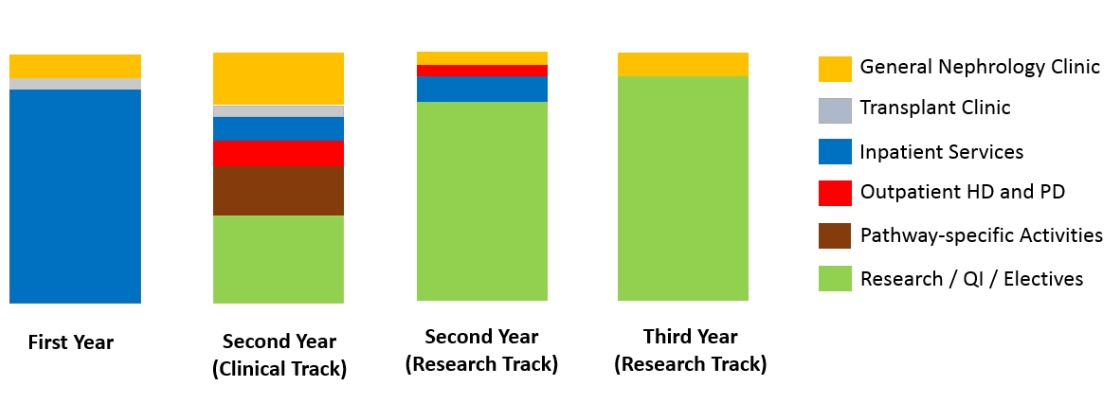 Training in the First Year of Fellowship
Training in the First Year of Fellowship
In the first year, clinical fellows spend approximately 75% of time at BMC and 25% of time at Boston VA.
Boston Medical Center Experience
At BMC, fellows have one half-day a week of continuity clinic, and rotate on following services.
- Consult A and Consult B Services: These services allow fellows to gain experience in providing consultative care for a variety of kidney, acid-base, electrolyte, and hypertension-related
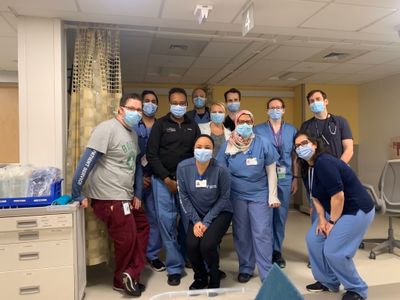 pathologies seen in the emergency department, medical wards, and intensive care units of an urban academic medical center. As BMC is the main hospital for most immigrant communities in Massachusetts, fellows learn to care for patients from a wide-range of socio-economic, ethnic and cultural backgrounds, and encounter pathologies that are not commonly seen in other health systems in the United States. Apart from the bread and butter nephrology, our fellows routinely consult on a variety of glomerular diseases, vasculitides and auto-immune kidney diseases in the hospital. Fellows learn to perform hemodialysis, peritoneal dialysis and continuous renal replacement therapies. They get opportunities to place temporary dialysis catheters, and are supervised to perform kidney biopsies. Intensive Care Unit, Interventional Radiology and Procedure Team services are available, if needed, to help the nephrology consult service with vascular access for dialysis. An average daily census on each of these services averages between 10-15 patients. A physician assistant is linked to these services to off-load fellows of cases with low educational value.
pathologies seen in the emergency department, medical wards, and intensive care units of an urban academic medical center. As BMC is the main hospital for most immigrant communities in Massachusetts, fellows learn to care for patients from a wide-range of socio-economic, ethnic and cultural backgrounds, and encounter pathologies that are not commonly seen in other health systems in the United States. Apart from the bread and butter nephrology, our fellows routinely consult on a variety of glomerular diseases, vasculitides and auto-immune kidney diseases in the hospital. Fellows learn to perform hemodialysis, peritoneal dialysis and continuous renal replacement therapies. They get opportunities to place temporary dialysis catheters, and are supervised to perform kidney biopsies. Intensive Care Unit, Interventional Radiology and Procedure Team services are available, if needed, to help the nephrology consult service with vascular access for dialysis. An average daily census on each of these services averages between 10-15 patients. A physician assistant is linked to these services to off-load fellows of cases with low educational value.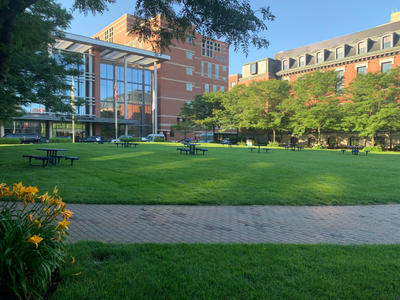
- Kidney Transplant Service: This service allows fellows to work one-on-one with transplant nephrologists and surgeons, and learn skills needed to care for new and established kidney transplant recipients. Fellows provide consultative care for transplant recipients admitted in the hospital, assess suitability for transplant recipient and donor candidates, and care for established transplant recipients in the outpatient kidney transplant clinic. In this rotation, fellows learn to perform transplant kidney biopsies, attend weekly multi-disciplinary transplant meetings, and learn to manage immunosuppressive agents, acute rejections and other transplant-related complications.
- Ambulatory Continuity Clinic: Nephrology Ambulatory Clinic is in the Shapiro Center of Boston Medical Center. In one-half day a week of continuity clinic, fellows are exposed to a broad spectrum of clinical pathologies given the regional and national reputation of our faculty and the diversity of our patient population. The clinic is staffed by a full time nurse, medical assistants, pharmacists, and administrative staff who assist physicians in clinical and administrative tasks.
Boston VA Experience
At Boston VA, a fellow from the Boston University’s program alternates weekly with a fellow from the Massachusetts General Hospital / Brigham and Women’s Hospital’s program in the inpatient and outpatient services. The inpatient service is a consult service at the West Roxbury Campus of VA Boston, and the outpatient service involves 4 half-days a week of clinic in the Jamaica Plan Campus of VA Boston. Boston University and Harvard University faculty supervise fellows in both VA campuses.
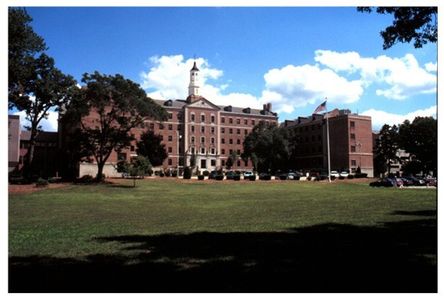
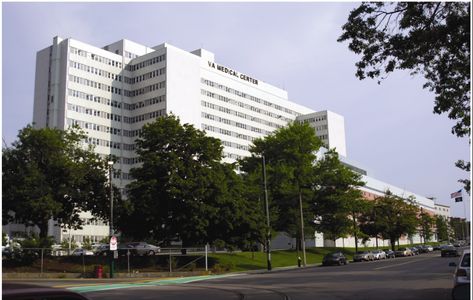
Training in the Second Year of Fellowship (for clinical track fellows)
Clinical track second-year fellows have approximately 4 weeks of inpatient experience. They maintain their weekly continuity clinic and attend one half-day of clinic at Boston VA when they are not on inpatient service. In addition, second-year fellows have a set of core outpatient experiences and may opt for one or more of enrichment training pathways and electives depending on their interest and career aspiration.
Training Structure for Clinical-track Second Year Fellows
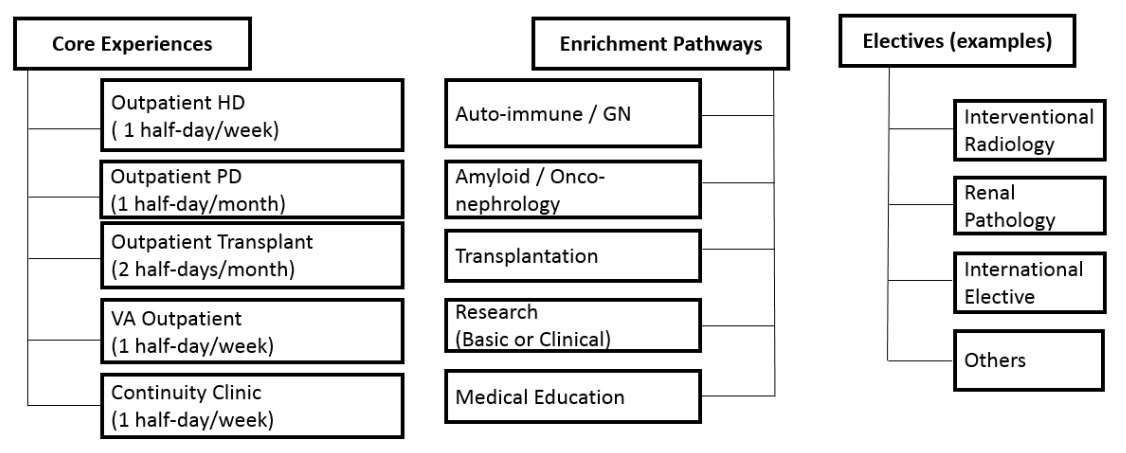
Core Outpatient Experiences
All clinical track fellows have the following core outpatient educational experiences in their second year:
- Outpatient Hemodialysis: Outpatient hemodialysis experience occurs at DaVita Boston Dialysis Center, which is located adjacent to BMC. Second-year fellows care for a cohort of 15 outpatient hemodialysis patients under a close supervision of a faculty assigned to the same shift. Fellows participate in monthly plan of care meetings for their patients with the supervising faculty, social worker, dietician, and charge nurse. This experience provides fellows with patient-care skills needed for outpatient hemodialysis management and allows them to understand the unique roles of different dialysis care team members.
- Outpatient Peritoneal Dialysis: Peritoneal dialysis training is a major strength of our program, supported by the largest cohort of peritoneal dialysis patients among clinics affiliated with academic nephrology practices in Massachusetts. Second-year fellows attend one half-day a month of outpatient peritoneal dialysis clinic located at the DaVita Boston Dialysis Center. Fellows, under the supervision of an attending physician, work with the multi-disciplinary team of nurses, dietician and social worker, and develop a monthly plan of care for patients. Fellows learn to set patient-specific peritoneal dialysis prescriptions and gain skills needed to manage peritoneal dialysis-related complications in the outpatient setting.
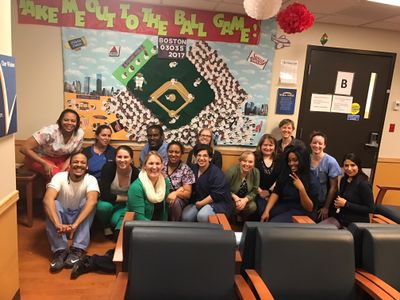
- Outpatient Kidney Transplantation: Second-year fellows care for patients in the outpatient kidney transplant clinic one half-day a month and the donor-recipient evaluation clinic one half-day a month. These experiences allow fellows to learn the nuances of transplant recipient and donor selection, become confident in managing kidney transplant related immunosuppressive medications and monitor patients for transplant-specific complications.
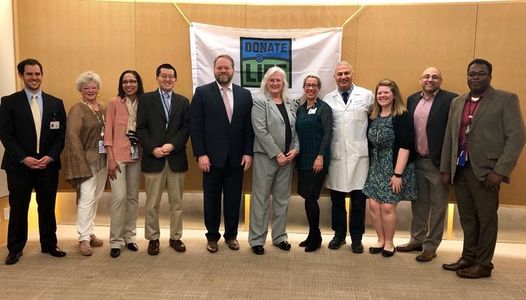
Enrichment Training Pathways
All clinical track fellows have the option of enriching their training experience by enrolling in one or more of training pathways in areas where Boston University has unique institutional strengths.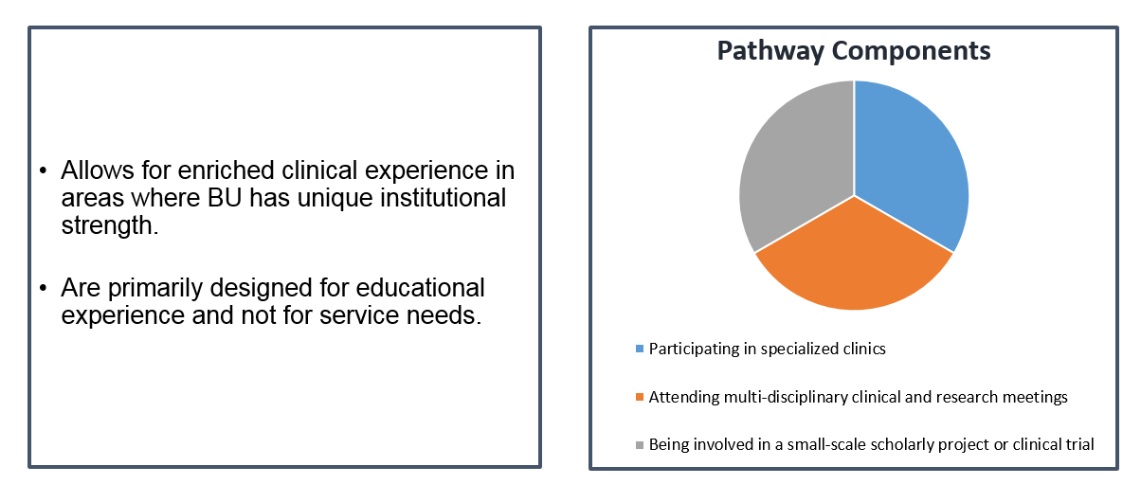
- Onco-nephrology / Amyloid Pathway
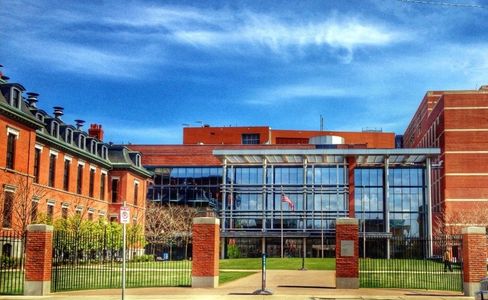
Onco-nephrology / Amyloid Pathway leverages Boston University’s internationally known amyloid program to provide one of a kind enrichment experience in onco-nephrology, systemic amyloidosis, and paraprotein mediated diseases to interested second-year clinical nephrology fellows.
Three nephrology faculty attend in the amyloid program, have a close relationship with BU’s hematology and oncology group, and see the bulk of onco-nephrology related referrals. The pathway experience involves participating in the specialized onco-nephrology / amyloid clinic, attending multi-disciplinary clinical and research meetings, and completing a scholarly work on onco-nephrology, systemic amyloidosis or paraprotein-mediated kidney disease. Dr. Andrea Havasi directs this pathway.
2. Lupus Nephritis / Auto-immune Disease Pathway
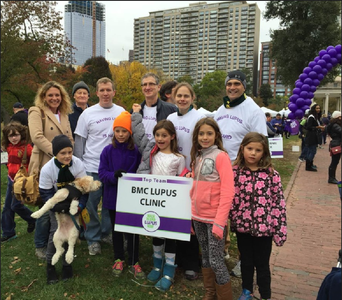 Lupus Nephritis / Auto-immune Disease Pathway seeks to allow interested clinical nephrology fellows to enrich their second-year clinical training experience by being involved in the activities of our specialized glomerular disease clinic and multidisciplinary lupus clinic at Boston Medical Center. The pathway experience involves participating in specialized clinics, attending multi-disciplinary clinical and research meetings, and completing a scholarly work on glomerular nephritis, lupus nephritis or another auto-immune disease. Interested fellows will also have the opportunity to be involved in multi-center clinical trials. Fellows in this pathway gain experience in immunosuppressive management for lupus nephritis and other auto-immune conditions. Dr. Hanni-Menn Josephy directs this pathway.
Lupus Nephritis / Auto-immune Disease Pathway seeks to allow interested clinical nephrology fellows to enrich their second-year clinical training experience by being involved in the activities of our specialized glomerular disease clinic and multidisciplinary lupus clinic at Boston Medical Center. The pathway experience involves participating in specialized clinics, attending multi-disciplinary clinical and research meetings, and completing a scholarly work on glomerular nephritis, lupus nephritis or another auto-immune disease. Interested fellows will also have the opportunity to be involved in multi-center clinical trials. Fellows in this pathway gain experience in immunosuppressive management for lupus nephritis and other auto-immune conditions. Dr. Hanni-Menn Josephy directs this pathway.
3. Research Pathway
The goals of the research pathway are to inspire and train the next generation of physician-scientists in Nephrology. The research pathway offers clinical nephrology fellows an opportunity to learn skills in basic or clinical investigation during their second-year of fellowship. Fellows in this pathway are required to have a mentored research project with a timeline that is feasible for the second-year schedule. The research project needs to be pre-approved by the Program Director, and there is an expectation for a publication or an ASN Kidney Week abstract by the end of the fellowship. In the past, second-year clinical fellows have successfully engaged in both basic science projects under the mentorship of our research faculty, and clinical epidemiologic projects under the mentorship of BU’s world-renowned Framingham Heart Study investigators. Those eligible for support from our NIH-funded institutional training grant (US citizens and permanent residents) may be selected for such support based on a commitment to two or more years of research training and a clearly defined goal of pursuing an academic career with a research focus.
4. Medical Education
Medical Education Pathway is designed for fellows who aspire for a career in medical education. The design of the pathway experience can be tailored to the individual needs of the fellow, and may include:
a. 6 weekly 1.5 hour workshops organized by the General Internal Medicine Section’s Medical Education Fellowship Program (1-2 renal fellows in a group of approximately 20 fellows from general medicine, family medicine and pediatrics)
b. Training and involvement in the Internal Medicine Residency Program’s Coaching Program
c. Observed teaching experiences with feedback in following settings:
- 4 weeks of mini-attending experience in our inpatient renal service (resident-run service caring for ESRD patients that always has 2-3 medical students)
- EBM workshop series for internal medicine residents
- Medical school’s second year renal pathophysiology course
- Medical school’s first-year introduction to clinical medicine course
5. Kidney Transplantation
Kidney Transplantation Pathway is designed for a fellow who wishes to pursue kidney transplantation fellowship after nephrology fellowship. The pathway is designed to provide an in-depth experience in donor-recipient evaluation, kidney transplant recipient care, transplantation immunology, and renal pathology specific to kidney transplantation. Between 2003-2019, approximately 25% of our fellows have gone on to kidney transplantation fellowship.
6. Other Electives:
In addition to our core and enrichment pathway experiences, interested second-year fellows may also elect to do an international rotation, or participate in electives in interventional nephrology, renal pathology, transplantation, home dialysis, etc.
